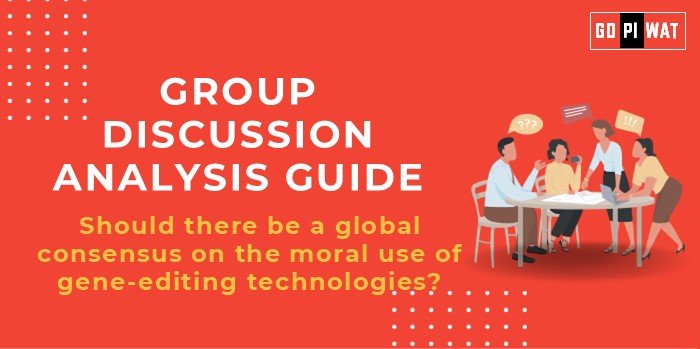📋 Group Discussion (GD) Analysis Guide: Should there be a global consensus on the moral use of gene-editing technologies?
🌐 Introduction to the Topic
Opening Context:
Gene-editing technologies like CRISPR have revolutionized medicine, agriculture, and scientific research. However, their potential to alter human DNA raises complex ethical questions, sparking debates about the need for a unified global framework to ensure responsible usage.
Topic Background:
The discovery of CRISPR-Cas9 in 2012 introduced unprecedented possibilities for genetic modifications. While gene-editing can eradicate diseases and enhance agricultural yields, it also poses risks like unintended mutations and ethical dilemmas around “designer babies.” Recent controversies, such as the 2018 gene-edited twins case in China, highlight the urgency for global regulatory mechanisms.
📊 Quick Facts and Key Statistics
- 🔬 CRISPR First Application (2013): Marked the start of accessible gene-editing.
- 💵 Cost of Gene Sequencing: Dropped to $100 in 2023, making gene-editing more widespread.
- 🌍 WHO Initiative (2021): Established ethical guidelines for heritable human genome editing.
- ⚖️ Global Consensus Gap: Only 30% of countries have binding regulations on gene-editing.
- 📈 Funding Growth: Gene-editing market expected to reach $25 billion by 2030.
🧩 Stakeholders and Their Roles
- 🏛️ Governments: Establish ethical guidelines and fund research.
- 🔬 Scientific Community: Conduct research and ensure ethical practices.
- 💼 Biotech Companies: Commercialize technology while adhering to regulations.
- 🌐 International Bodies (WHO, UNESCO): Advocate for global standards and address disparities.
- 👥 Civil Society: Shape public opinion and push for ethical accountability.
🏆 Achievements and Challenges
✨ Achievements:
- 🏥 Medical Advancements: Gene-editing has successfully treated diseases like sickle cell anemia.
- 🌾 Agricultural Impact: Increased crop yields through pest-resistant genes.
- 🔍 Innovative Research: Enabled studies in previously inaccessible areas of genomics.
⚠️ Challenges:
- ⚖️ Ethical Dilemmas: Risks of eugenics and designer babies.
- 🌍 Access Inequality: Technologies remain unaffordable for developing nations.
- 📜 Regulatory Disparities: Lack of uniform global standards.
🌎 Global Comparisons:
- 🇺🇸 USA: Robust biotech research with ethical oversight.
- 🇨🇳 China: Rapid adoption but criticized for ethical breaches (e.g., gene-edited babies).
- 🇩🇪 Germany: Strict laws prohibiting heritable genome editing.
Case Studies:
- USA: CRISPR successfully edited faulty genes in sickle cell treatment.
- Philippines: Genetically modified Golden Rice alleviated vitamin A deficiency.
💬 Structured Arguments for Discussion
- Supporting Stance: “Global consensus can prevent misuse of gene-editing technologies and ensure equitable access.”
- Opposing Stance: “Diverse cultural values make a universal ethical standard impractical.”
- Balanced Perspective: “A hybrid model with regional autonomy under global oversight could balance ethics and innovation.”
📚 Effective Discussion Approaches
Opening Approaches:
- 📊 Provocative Statistic: “Over 60% of gene-editing applications remain unregulated globally.”
- 💭 Highlight Ethical Dilemmas: “CRISPR’s potential to cure diseases also opens Pandora’s box of eugenics.”
Counter-Argument Handling:
- ✔️ Challenge: “Uniform global standards may stifle innovation.”
- 💡 Response: “Collaboration ensures innovation thrives within ethical boundaries.”
📈 Strategic Analysis of Strengths and Weaknesses
- ✔️ Strengths: Promotes ethical use, prevents misuse, fosters global collaboration.
- ❌ Weaknesses: Regulatory delays, cultural disagreements, high enforcement costs.
- 💡 Opportunities: Advancing medicine, mitigating climate change impacts, boosting agricultural security.
- ⚠️ Threats: Bio-terrorism, unequal access, ethical controversies.
🏫 Connecting with B-School Applications
Real-World Applications:
- 🌟 Opportunities for projects in healthcare ethics, sustainable agriculture, and biotech policy analysis.
Sample Interview Questions:
- ❓ “How can global governance of gene-editing balance innovation with ethics?”
- ❓ “What lessons can India draw from global gene-editing practices?”
Insights for B-School Students:
- 💼 Explore the economic potential of regulated gene-editing markets.
- 🔍 Assess risks of unregulated biotech proliferation.


